Critique of the Article: Nursing Assignment
VerifiedAdded on 2022/12/19
|7
|1668
|38
AI Summary
This critique of the article discusses the legal issues related to informed consent from elderly patients in medical surgical nursing. It explores the importance of patient autonomy and shared decision making in the informed consent process. The article also highlights the ethical considerations and responsibilities of nurses in respecting patient's wishes and promoting choices in healthcare provision.
Contribute Materials
Your contribution can guide someone’s learning journey. Share your
documents today.
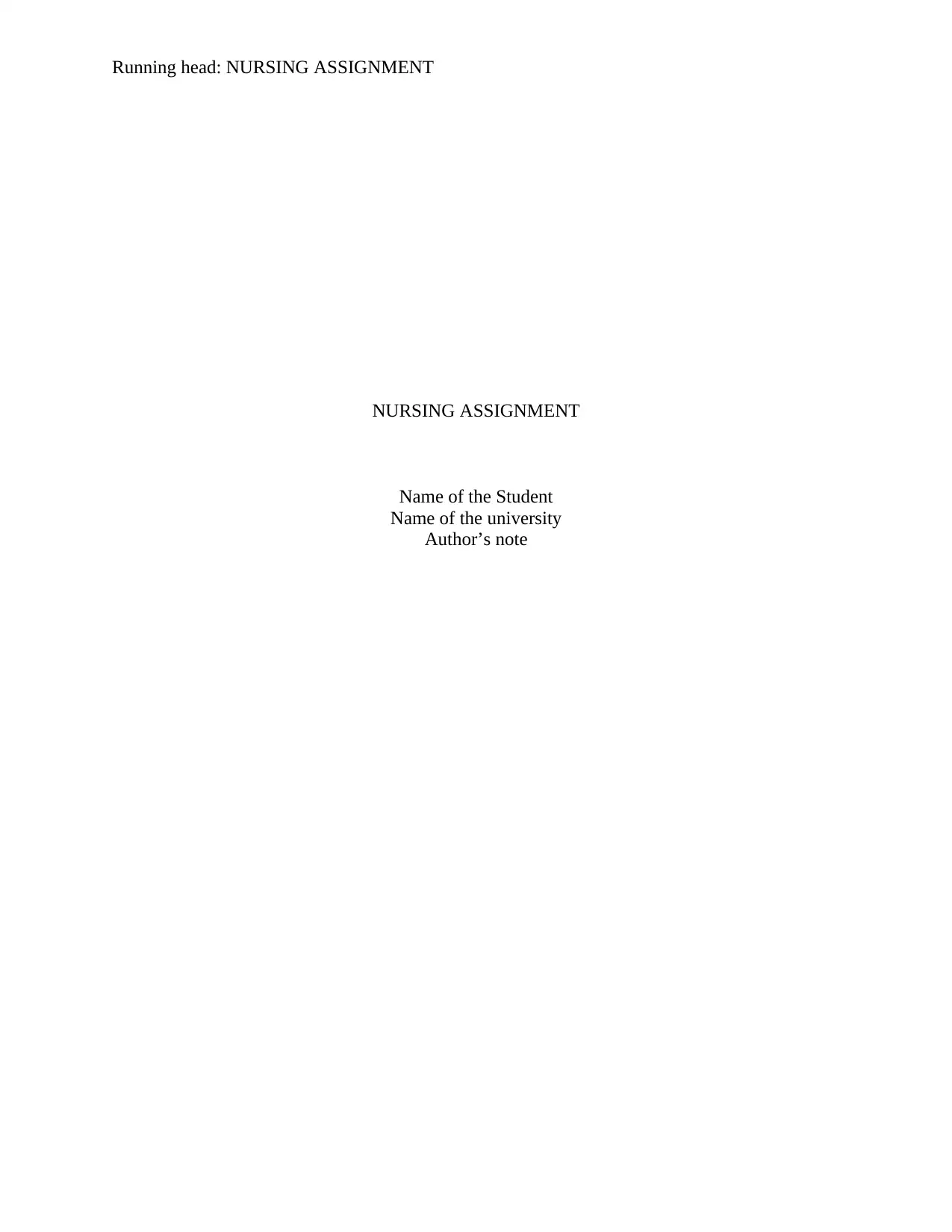
Running head: NURSING ASSIGNMENT
NURSING ASSIGNMENT
Name of the Student
Name of the university
Author’s note
NURSING ASSIGNMENT
Name of the Student
Name of the university
Author’s note
Secure Best Marks with AI Grader
Need help grading? Try our AI Grader for instant feedback on your assignments.
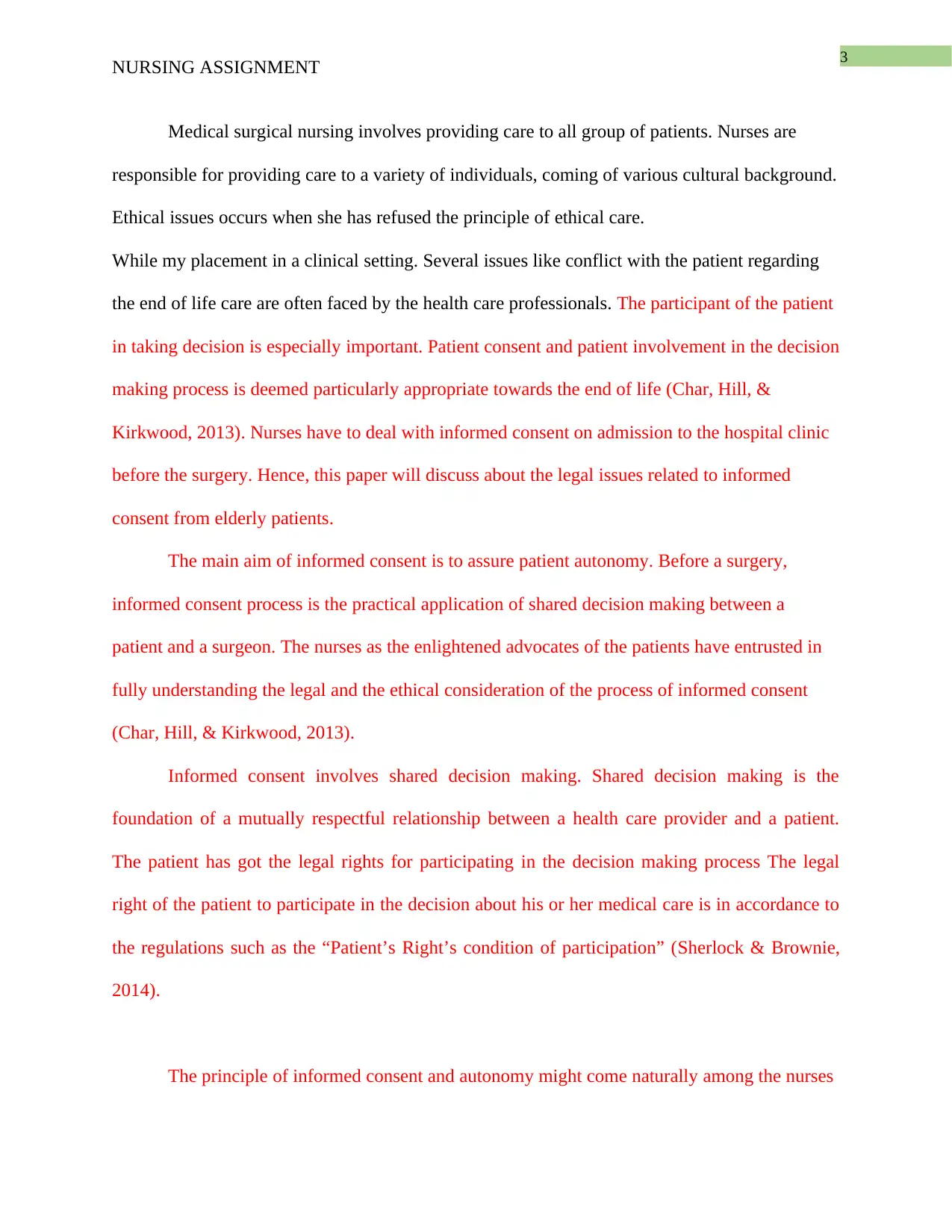
3
CRITIQUE OF THE ARTICLE
NURSING ASSIGNMENT
Medical surgical nursing involves providing care to all group of patients. Nurses are
responsible for providing care to a variety of individuals, coming of various cultural background.
Ethical issues occurs when she has refused the principle of ethical care.
While my placement in a clinical setting. Several issues like conflict with the patient regarding
the end of life care are often faced by the health care professionals. The participant of the patient
in taking decision is especially important. Patient consent and patient involvement in the decision
making process is deemed particularly appropriate towards the end of life (Char, Hill, &
Kirkwood, 2013). Nurses have to deal with informed consent on admission to the hospital clinic
before the surgery. Hence, this paper will discuss about the legal issues related to informed
consent from elderly patients.
The main aim of informed consent is to assure patient autonomy. Before a surgery,
informed consent process is the practical application of shared decision making between a
patient and a surgeon. The nurses as the enlightened advocates of the patients have entrusted in
fully understanding the legal and the ethical consideration of the process of informed consent
(Char, Hill, & Kirkwood, 2013).
Informed consent involves shared decision making. Shared decision making is the
foundation of a mutually respectful relationship between a health care provider and a patient.
The patient has got the legal rights for participating in the decision making process The legal
right of the patient to participate in the decision about his or her medical care is in accordance to
the regulations such as the “Patient’s Right’s condition of participation” (Sherlock & Brownie,
2014).
The principle of informed consent and autonomy might come naturally among the nurses
CRITIQUE OF THE ARTICLE
NURSING ASSIGNMENT
Medical surgical nursing involves providing care to all group of patients. Nurses are
responsible for providing care to a variety of individuals, coming of various cultural background.
Ethical issues occurs when she has refused the principle of ethical care.
While my placement in a clinical setting. Several issues like conflict with the patient regarding
the end of life care are often faced by the health care professionals. The participant of the patient
in taking decision is especially important. Patient consent and patient involvement in the decision
making process is deemed particularly appropriate towards the end of life (Char, Hill, &
Kirkwood, 2013). Nurses have to deal with informed consent on admission to the hospital clinic
before the surgery. Hence, this paper will discuss about the legal issues related to informed
consent from elderly patients.
The main aim of informed consent is to assure patient autonomy. Before a surgery,
informed consent process is the practical application of shared decision making between a
patient and a surgeon. The nurses as the enlightened advocates of the patients have entrusted in
fully understanding the legal and the ethical consideration of the process of informed consent
(Char, Hill, & Kirkwood, 2013).
Informed consent involves shared decision making. Shared decision making is the
foundation of a mutually respectful relationship between a health care provider and a patient.
The patient has got the legal rights for participating in the decision making process The legal
right of the patient to participate in the decision about his or her medical care is in accordance to
the regulations such as the “Patient’s Right’s condition of participation” (Sherlock & Brownie,
2014).
The principle of informed consent and autonomy might come naturally among the nurses
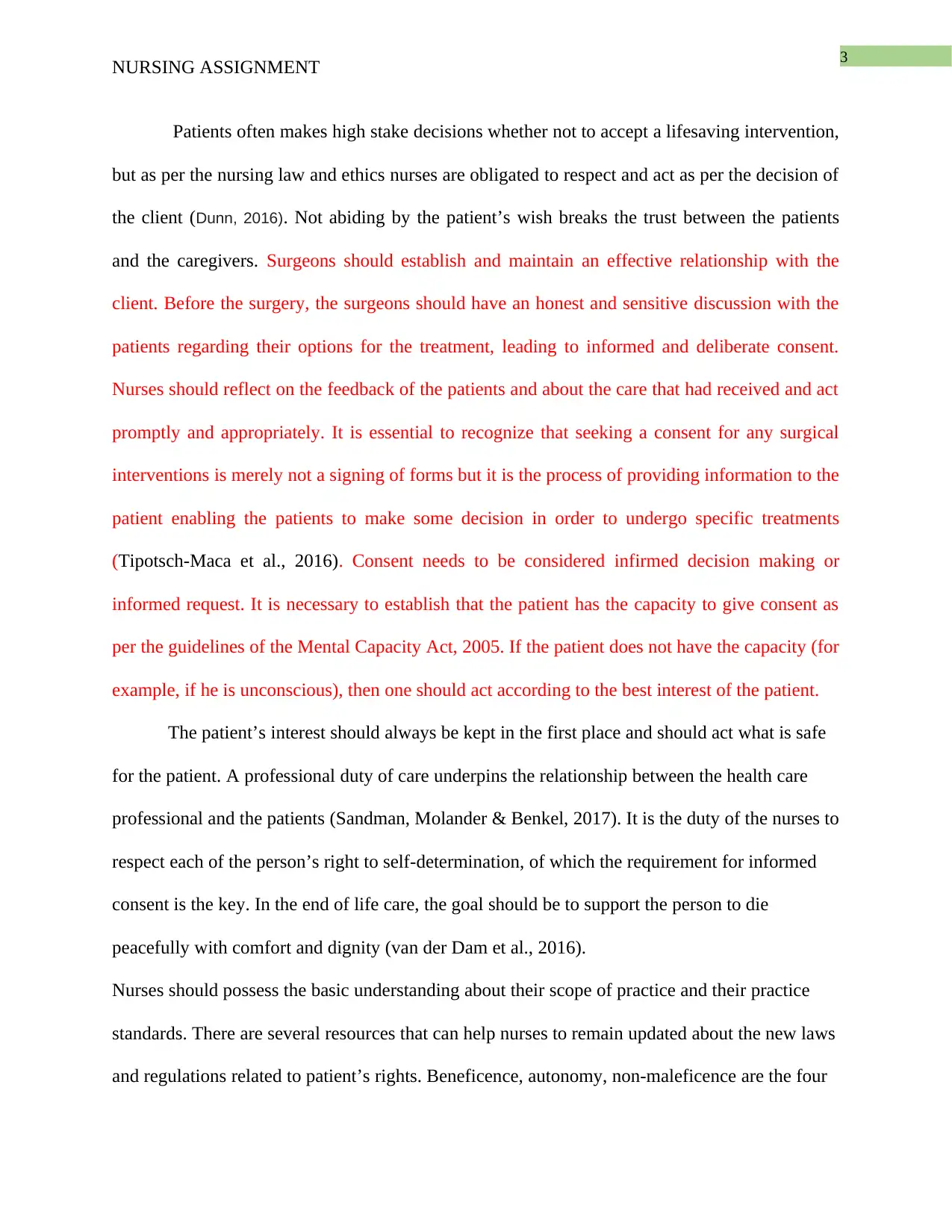
3
CRITIQUE OF THE ARTICLE
NURSING ASSIGNMENT
Patients often makes high stake decisions whether not to accept a lifesaving intervention,
but as per the nursing law and ethics nurses are obligated to respect and act as per the decision of
the client (Dunn, 2016). Not abiding by the patient’s wish breaks the trust between the patients
and the caregivers. Surgeons should establish and maintain an effective relationship with the
client. Before the surgery, the surgeons should have an honest and sensitive discussion with the
patients regarding their options for the treatment, leading to informed and deliberate consent.
Nurses should reflect on the feedback of the patients and about the care that had received and act
promptly and appropriately. It is essential to recognize that seeking a consent for any surgical
interventions is merely not a signing of forms but it is the process of providing information to the
patient enabling the patients to make some decision in order to undergo specific treatments
(Tipotsch-Maca et al., 2016). Consent needs to be considered infirmed decision making or
informed request. It is necessary to establish that the patient has the capacity to give consent as
per the guidelines of the Mental Capacity Act, 2005. If the patient does not have the capacity (for
example, if he is unconscious), then one should act according to the best interest of the patient.
The patient’s interest should always be kept in the first place and should act what is safe
for the patient. A professional duty of care underpins the relationship between the health care
professional and the patients (Sandman, Molander & Benkel, 2017). It is the duty of the nurses to
respect each of the person’s right to self-determination, of which the requirement for informed
consent is the key. In the end of life care, the goal should be to support the person to die
peacefully with comfort and dignity (van der Dam et al., 2016).
Nurses should possess the basic understanding about their scope of practice and their practice
standards. There are several resources that can help nurses to remain updated about the new laws
and regulations related to patient’s rights. Beneficence, autonomy, non-maleficence are the four
CRITIQUE OF THE ARTICLE
NURSING ASSIGNMENT
Patients often makes high stake decisions whether not to accept a lifesaving intervention,
but as per the nursing law and ethics nurses are obligated to respect and act as per the decision of
the client (Dunn, 2016). Not abiding by the patient’s wish breaks the trust between the patients
and the caregivers. Surgeons should establish and maintain an effective relationship with the
client. Before the surgery, the surgeons should have an honest and sensitive discussion with the
patients regarding their options for the treatment, leading to informed and deliberate consent.
Nurses should reflect on the feedback of the patients and about the care that had received and act
promptly and appropriately. It is essential to recognize that seeking a consent for any surgical
interventions is merely not a signing of forms but it is the process of providing information to the
patient enabling the patients to make some decision in order to undergo specific treatments
(Tipotsch-Maca et al., 2016). Consent needs to be considered infirmed decision making or
informed request. It is necessary to establish that the patient has the capacity to give consent as
per the guidelines of the Mental Capacity Act, 2005. If the patient does not have the capacity (for
example, if he is unconscious), then one should act according to the best interest of the patient.
The patient’s interest should always be kept in the first place and should act what is safe
for the patient. A professional duty of care underpins the relationship between the health care
professional and the patients (Sandman, Molander & Benkel, 2017). It is the duty of the nurses to
respect each of the person’s right to self-determination, of which the requirement for informed
consent is the key. In the end of life care, the goal should be to support the person to die
peacefully with comfort and dignity (van der Dam et al., 2016).
Nurses should possess the basic understanding about their scope of practice and their practice
standards. There are several resources that can help nurses to remain updated about the new laws
and regulations related to patient’s rights. Beneficence, autonomy, non-maleficence are the four
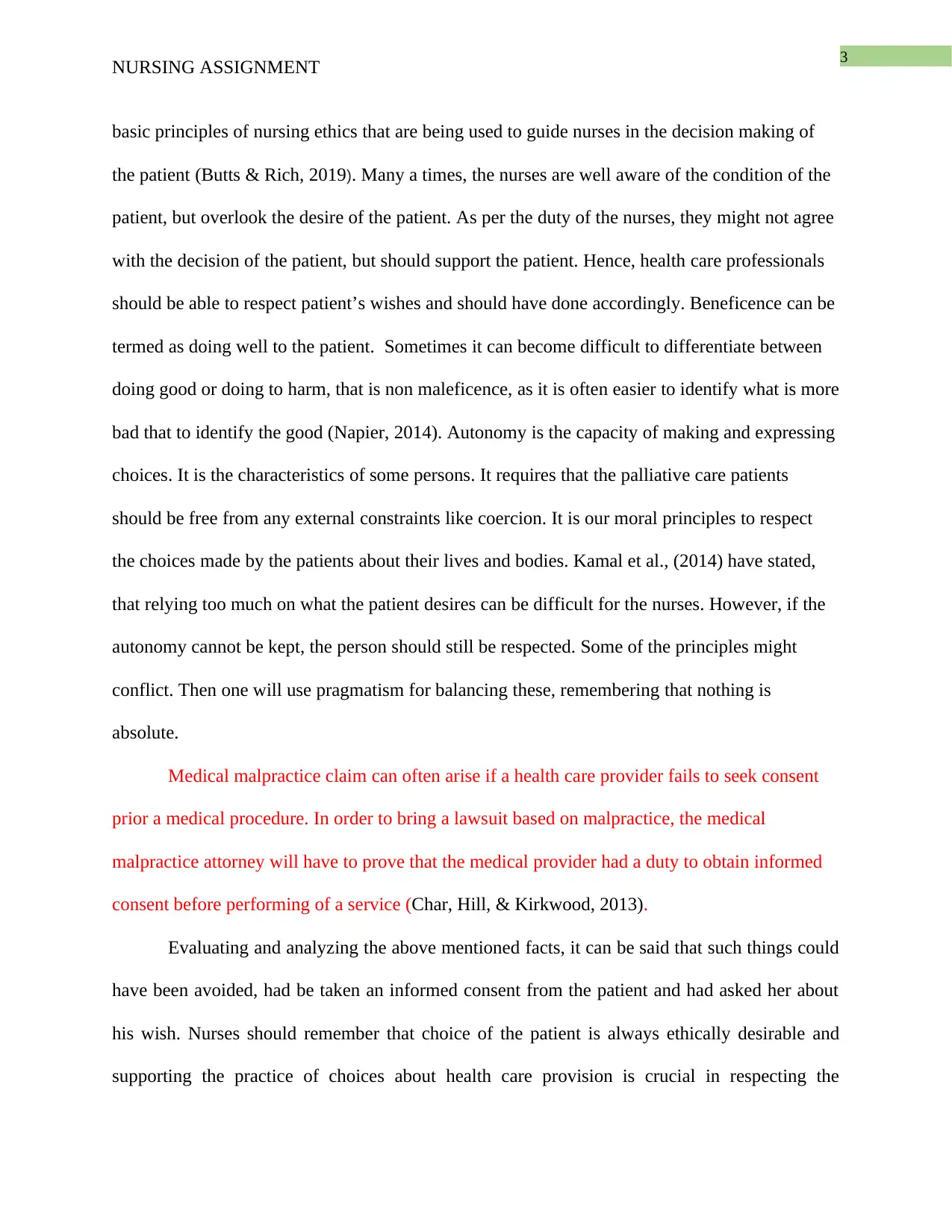
3
CRITIQUE OF THE ARTICLE
NURSING ASSIGNMENT
basic principles of nursing ethics that are being used to guide nurses in the decision making of
the patient (Butts & Rich, 2019). Many a times, the nurses are well aware of the condition of the
patient, but overlook the desire of the patient. As per the duty of the nurses, they might not agree
with the decision of the patient, but should support the patient. Hence, health care professionals
should be able to respect patient’s wishes and should have done accordingly. Beneficence can be
termed as doing well to the patient. Sometimes it can become difficult to differentiate between
doing good or doing to harm, that is non maleficence, as it is often easier to identify what is more
bad that to identify the good (Napier, 2014). Autonomy is the capacity of making and expressing
choices. It is the characteristics of some persons. It requires that the palliative care patients
should be free from any external constraints like coercion. It is our moral principles to respect
the choices made by the patients about their lives and bodies. Kamal et al., (2014) have stated,
that relying too much on what the patient desires can be difficult for the nurses. However, if the
autonomy cannot be kept, the person should still be respected. Some of the principles might
conflict. Then one will use pragmatism for balancing these, remembering that nothing is
absolute.
Medical malpractice claim can often arise if a health care provider fails to seek consent
prior a medical procedure. In order to bring a lawsuit based on malpractice, the medical
malpractice attorney will have to prove that the medical provider had a duty to obtain informed
consent before performing of a service (Char, Hill, & Kirkwood, 2013).
Evaluating and analyzing the above mentioned facts, it can be said that such things could
have been avoided, had be taken an informed consent from the patient and had asked her about
his wish. Nurses should remember that choice of the patient is always ethically desirable and
supporting the practice of choices about health care provision is crucial in respecting the
CRITIQUE OF THE ARTICLE
NURSING ASSIGNMENT
basic principles of nursing ethics that are being used to guide nurses in the decision making of
the patient (Butts & Rich, 2019). Many a times, the nurses are well aware of the condition of the
patient, but overlook the desire of the patient. As per the duty of the nurses, they might not agree
with the decision of the patient, but should support the patient. Hence, health care professionals
should be able to respect patient’s wishes and should have done accordingly. Beneficence can be
termed as doing well to the patient. Sometimes it can become difficult to differentiate between
doing good or doing to harm, that is non maleficence, as it is often easier to identify what is more
bad that to identify the good (Napier, 2014). Autonomy is the capacity of making and expressing
choices. It is the characteristics of some persons. It requires that the palliative care patients
should be free from any external constraints like coercion. It is our moral principles to respect
the choices made by the patients about their lives and bodies. Kamal et al., (2014) have stated,
that relying too much on what the patient desires can be difficult for the nurses. However, if the
autonomy cannot be kept, the person should still be respected. Some of the principles might
conflict. Then one will use pragmatism for balancing these, remembering that nothing is
absolute.
Medical malpractice claim can often arise if a health care provider fails to seek consent
prior a medical procedure. In order to bring a lawsuit based on malpractice, the medical
malpractice attorney will have to prove that the medical provider had a duty to obtain informed
consent before performing of a service (Char, Hill, & Kirkwood, 2013).
Evaluating and analyzing the above mentioned facts, it can be said that such things could
have been avoided, had be taken an informed consent from the patient and had asked her about
his wish. Nurses should remember that choice of the patient is always ethically desirable and
supporting the practice of choices about health care provision is crucial in respecting the
Secure Best Marks with AI Grader
Need help grading? Try our AI Grader for instant feedback on your assignments.

3
CRITIQUE OF THE ARTICLE
NURSING ASSIGNMENT
autonomy of the patient. Promotion of choices about how and where the health care is received
greatly influences he quality of life of the patient (Kamal et al., 2014).
CRITIQUE OF THE ARTICLE
NURSING ASSIGNMENT
autonomy of the patient. Promotion of choices about how and where the health care is received
greatly influences he quality of life of the patient (Kamal et al., 2014).
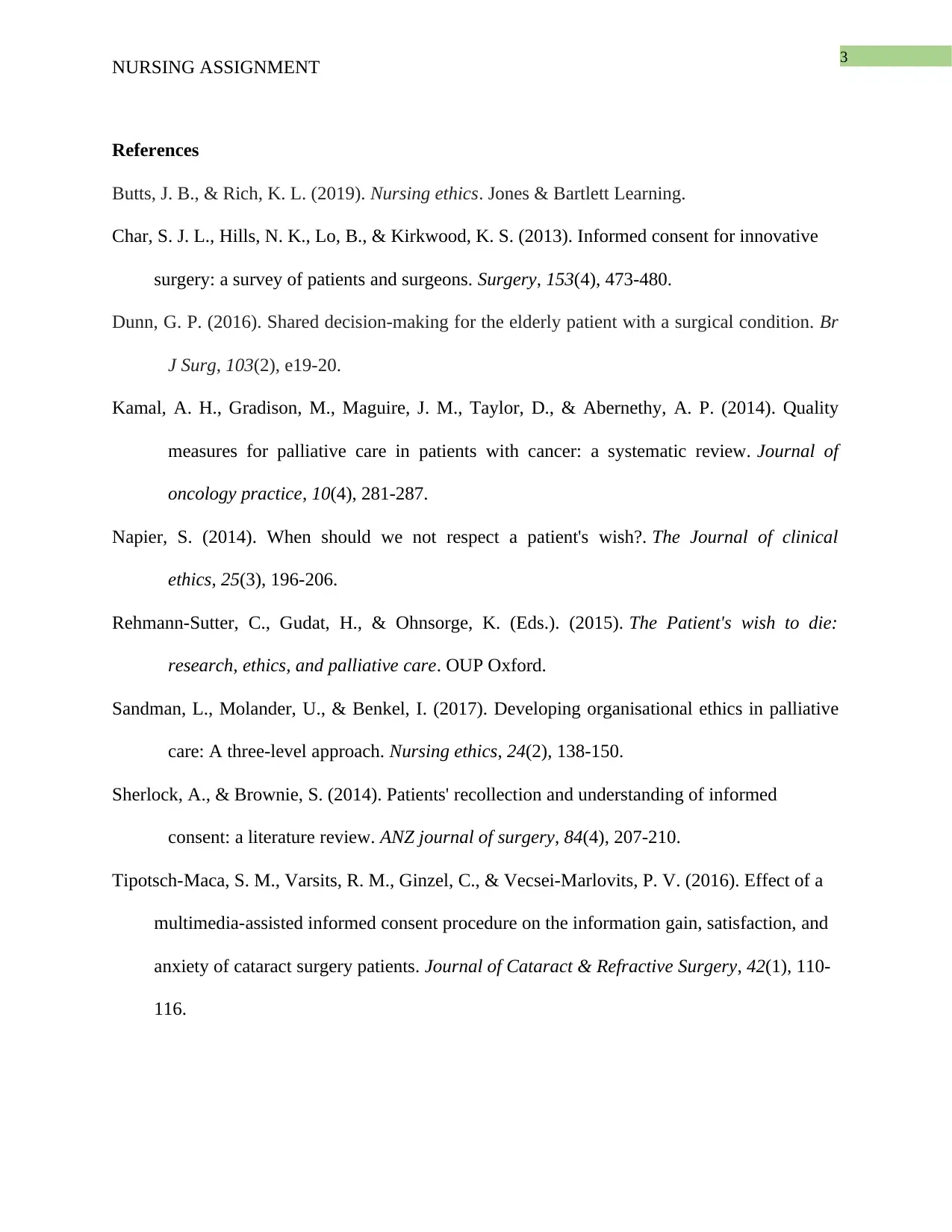
3
CRITIQUE OF THE ARTICLE
NURSING ASSIGNMENT
References
Butts, J. B., & Rich, K. L. (2019). Nursing ethics. Jones & Bartlett Learning.
Char, S. J. L., Hills, N. K., Lo, B., & Kirkwood, K. S. (2013). Informed consent for innovative
surgery: a survey of patients and surgeons. Surgery, 153(4), 473-480.
Dunn, G. P. (2016). Shared decision-making for the elderly patient with a surgical condition. Br
J Surg, 103(2), e19-20.
Kamal, A. H., Gradison, M., Maguire, J. M., Taylor, D., & Abernethy, A. P. (2014). Quality
measures for palliative care in patients with cancer: a systematic review. Journal of
oncology practice, 10(4), 281-287.
Napier, S. (2014). When should we not respect a patient's wish?. The Journal of clinical
ethics, 25(3), 196-206.
Rehmann-Sutter, C., Gudat, H., & Ohnsorge, K. (Eds.). (2015). The Patient's wish to die:
research, ethics, and palliative care. OUP Oxford.
Sandman, L., Molander, U., & Benkel, I. (2017). Developing organisational ethics in palliative
care: A three-level approach. Nursing ethics, 24(2), 138-150.
Sherlock, A., & Brownie, S. (2014). Patients' recollection and understanding of informed
consent: a literature review. ANZ journal of surgery, 84(4), 207-210.
Tipotsch-Maca, S. M., Varsits, R. M., Ginzel, C., & Vecsei-Marlovits, P. V. (2016). Effect of a
multimedia-assisted informed consent procedure on the information gain, satisfaction, and
anxiety of cataract surgery patients. Journal of Cataract & Refractive Surgery, 42(1), 110-
116.
CRITIQUE OF THE ARTICLE
NURSING ASSIGNMENT
References
Butts, J. B., & Rich, K. L. (2019). Nursing ethics. Jones & Bartlett Learning.
Char, S. J. L., Hills, N. K., Lo, B., & Kirkwood, K. S. (2013). Informed consent for innovative
surgery: a survey of patients and surgeons. Surgery, 153(4), 473-480.
Dunn, G. P. (2016). Shared decision-making for the elderly patient with a surgical condition. Br
J Surg, 103(2), e19-20.
Kamal, A. H., Gradison, M., Maguire, J. M., Taylor, D., & Abernethy, A. P. (2014). Quality
measures for palliative care in patients with cancer: a systematic review. Journal of
oncology practice, 10(4), 281-287.
Napier, S. (2014). When should we not respect a patient's wish?. The Journal of clinical
ethics, 25(3), 196-206.
Rehmann-Sutter, C., Gudat, H., & Ohnsorge, K. (Eds.). (2015). The Patient's wish to die:
research, ethics, and palliative care. OUP Oxford.
Sandman, L., Molander, U., & Benkel, I. (2017). Developing organisational ethics in palliative
care: A three-level approach. Nursing ethics, 24(2), 138-150.
Sherlock, A., & Brownie, S. (2014). Patients' recollection and understanding of informed
consent: a literature review. ANZ journal of surgery, 84(4), 207-210.
Tipotsch-Maca, S. M., Varsits, R. M., Ginzel, C., & Vecsei-Marlovits, P. V. (2016). Effect of a
multimedia-assisted informed consent procedure on the information gain, satisfaction, and
anxiety of cataract surgery patients. Journal of Cataract & Refractive Surgery, 42(1), 110-
116.
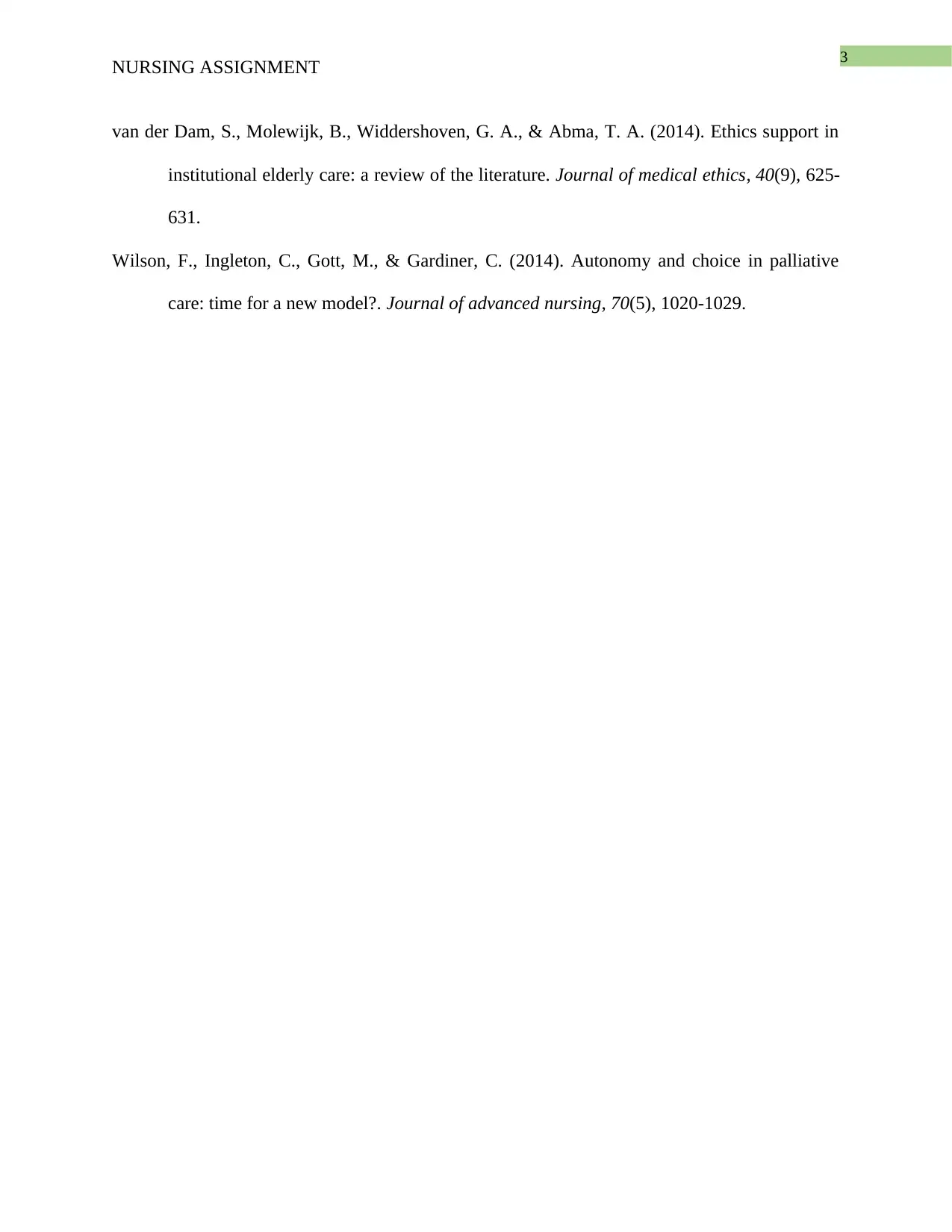
3
CRITIQUE OF THE ARTICLE
NURSING ASSIGNMENT
van der Dam, S., Molewijk, B., Widdershoven, G. A., & Abma, T. A. (2014). Ethics support in
institutional elderly care: a review of the literature. Journal of medical ethics, 40(9), 625-
631.
Wilson, F., Ingleton, C., Gott, M., & Gardiner, C. (2014). Autonomy and choice in palliative
care: time for a new model?. Journal of advanced nursing, 70(5), 1020-1029.
CRITIQUE OF THE ARTICLE
NURSING ASSIGNMENT
van der Dam, S., Molewijk, B., Widdershoven, G. A., & Abma, T. A. (2014). Ethics support in
institutional elderly care: a review of the literature. Journal of medical ethics, 40(9), 625-
631.
Wilson, F., Ingleton, C., Gott, M., & Gardiner, C. (2014). Autonomy and choice in palliative
care: time for a new model?. Journal of advanced nursing, 70(5), 1020-1029.
1 out of 7
Related Documents
Your All-in-One AI-Powered Toolkit for Academic Success.
+13062052269
info@desklib.com
Available 24*7 on WhatsApp / Email
![[object Object]](/_next/static/media/star-bottom.7253800d.svg)
Unlock your academic potential
© 2024 | Zucol Services PVT LTD | All rights reserved.





